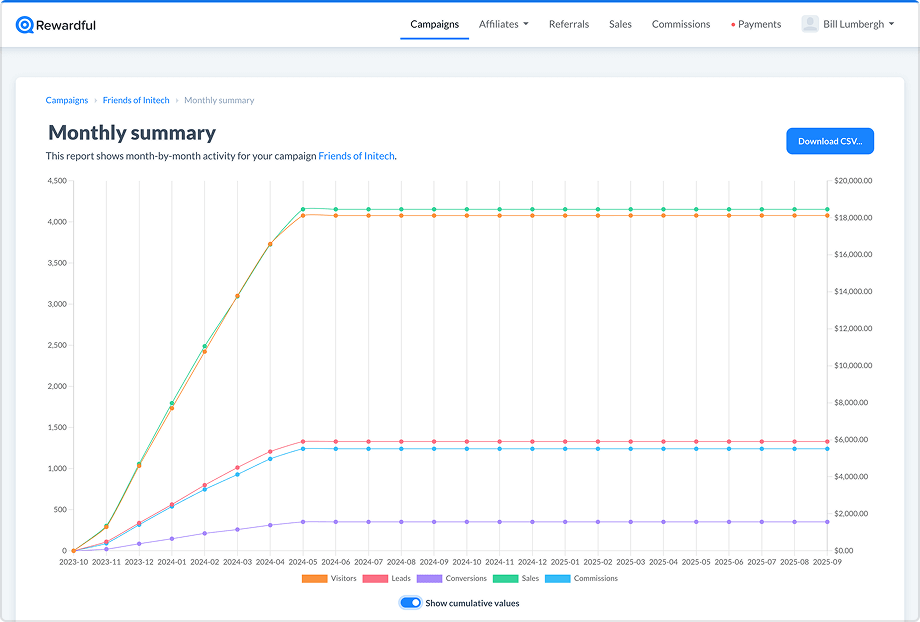Starting an affiliate program can be a daunting task, especially if you've never done it before.
This affiliate marketing checklist is a comprehensive guide for beginners, covering everything from preparation to post-live checks based on the most successful affiliate marketing programs.
We're here to ensure you’ve got everything you need for an effective affiliate marketing strategy.
Pre Checklist for Launching an Affiliate Program
Here are 12 things you should prepare before starting an affiliate program.

1. Assess Your Business
Before launching an affiliate program, assess whether your business will benefit from affiliate marketing.
For example, does it fit into your strategy and business goals, do you have the necessary bandwidth to manage affiliate campaigns, and do you have the right affiliate tools and infrastructure for tracking links, sales and affiliates?
Make sure you answer these questions before launching your affiliate program.
2. Check Out the Competition
Perform a thorough competitive analysis. Make sure you familiarize yourself with your competitors and their affiliate programs. For instance, their commission structures, marketing channels, affiliate partners, and general online presence.
Understanding what’s working for them can help you improve your own program.
3. Define Your Affiliate Marketing Goals
To know your affiliate program goals, answer this question: Why do you want to get started with affiliate marketing in the first place? Consider your business objectives, marketing goals, and revenue targets.
For instance, you may want to reach new audience groups, go international, or simply earn more revenue for your business. Whatever your aims, you will need to define success. Pick some affiliate metrics that best measure your success.
Some affiliate metrics that are commonly used are affiliate traffic, sales per affiliates, and cost per affiliate sale. Need the formula to calculate them? Head to our affiliate marketing guide to find out more.
4. Define Your Ideal Affiliates
Before you start recruiting affiliates, think about who is the best partner for your brand?
Here is a tip: the best affiliates are usually your brand’s target audience also known as your ideal customer persona (ICP). You may also want to recruit some influencers to gain more authority or explore new audience groups.
Check out this guide to help you define your ideal affiliates, and learn more about different types of affiliates and their best use cases here.
5. Create a Sustainable Affiliate Recruitment Plan
The most critical success factor for any affiliate program is recruitment. Identify suitable affiliates and provide them with all the materials, information, and guidance you'd like them to use. Set aside resources to build strong affiliate partnerships and onboard new affiliates effectively.
The key is to offer them personalized attention, and build strong relationships with them. You’ll find all the tips you need for affiliate recruitment in this article.
6. Set up a Simple Sign-Up Process
Make the sign-up process easy for potential affiliates. Provide clear instructions and forms to fill out and establish a smooth onboarding process. The easier it is, the more potential partners will sign up.
7. Create an Affiliate Onboarding Plan
People who are new to affiliate marketing often get lost after they successfully join an affiliate program. Why? They don’t get enough guidance and training from the brand to perform well. Don’t make this common affiliate marketing mistake.
Make sure your affiliates all get a warm welcome and all the promotional materials they need to start sending you affiliate traffic. Create an onboarding plan split into mini steps, provide affiliate email templates, all the necessary affiliate links and coupon codes, and anything else brand-new affiliates need to hit the ground running. Build up their confidence in promoting your brand, and you’ll soon see the results they can bring to your bottom line.
8. Create a Landing Page for Your Affiliate Program
An affiliate program landing page is where it starts for most of your affiliates, therefore, you need to get it ready before launching an affiliate program. Remember to include not only content that makes your program sound desirable but also answer questions and take away any doubts.
9. Set Aside a Marketing Budget and Resources
With your end goals in mind, set a budget for your affiliate program.
This budget will include commission rates, marketing costs, and affiliate management software fees.
It is true that a higher commission will attract better and more enthusiastic potential affiliates who will work harder to promote your brand. However, be careful not to overcommit financially. Plus, financial benefits are not the only thing that can drive affiliates to perform well. Other benefits, such as access to beta testing, co-marketing opportunities, and strong partnerships are often more valuable than monetary rewards.
10. Choose the Best Affiliate Marketing Tool
The right affiliate management software can have a direct effect on your program's success.
Look for affiliate marketing software that is user-friendly, customizable, and offers a range of features, including tracking links, dynamic commission structures, popular affiliate payout solutions, and accurate insights. Most importantly, it should have excellent customer support, should anything go wrong.
We might be biased, but we recommend Rewardful, especially if you run a SaaS or subscription-based affiliate marketing program. Many of our happy clients have experienced the difference between Rewardful and other affiliate tools and how it can simplify their affiliate management efforts.
Take HeadshotPro, for instance. Their AI affiliate program contributed 15% to their monthly revenue. Read their case study to learn more.

11. Appoint an Affiliate Marketing Manager
Appoint someone on your team to lead the affiliate marketing project; preferably someone who knows about affiliate marketing, who can talk to future and current affiliate partners, and who can steer the affiliate program.
They can, of course, be part of the marketing team—just make sure they have the necessary time available to dedicate to this aspect of your business.
Related: how to recruit an affiliate program manager
12. Structure and Validate Your Affiliate Program
How you structure your affiliate program can be the difference between success and failure. Here are a few key pointers to ensure you’re on the right track:
Set commission rates that are both competitive and profitable for your business. How much is the standard commission rate for a SaaS affiliate program? We looked through Rewardful’s top-performing affiliate programs and found that they range from 19 to 24%. Get more real-life affiliate program data to benchmark your affiliate program performance.
Establish cookie duration periods that don't leave affiliates feeling unsupported. Additionally, consider adding generous incentives or bonuses to encourage long-term success.
When you’ve done that, ensure that your affiliate program structure is scalable and sustainable. Be flexible and willing to adapt to any changes that may arise.
Post Checklist for Launching an Affiliate Program
Congratulations! You have successfully launched your affiliate program. However, the journey doesn’t stop there. There are other affiliate program management tasks that you need to do to ensure that your program will grow and your affiliates are happy and continuously delivering.
Here are a few things to keep in mind post launching an affiliate program.

1. Create Marketing Materials to Support Your Affiliate Marketing Campaigns
You want to set your affiliates up for success, not failure. That’s why creating affiliate marketing materials is very important.
Make sure you create great-looking and on-brand content for them to use. If they use tools like Canva, you can allow them to make modifications to further personalize materials.
Also, provide them with guidelines and a style guide, and other tips to make the most out of their affiliate marketing efforts.
2. Offer Training to Support Your Affiliates
Offer educational resources like webinars or tutorials to help your affiliates become more effective marketers and grow their businesses alongside yours. It doesn't even need to be your own content – you can refer them to other expert resources as well. Just make sure it's easy for them to find.
3. Set Clear Guidelines and Expectations
Provide clear guidelines and expectations for your affiliates to avoid any misunderstandings that may arise. This helps to establish a good working relationship between you and your affiliates. For instance, can they advertise on Google? How do payments work? Make sure all the practicalities are covered before you start.
4. Make Sure You Measure and Report Your Affiliates’ Performance
This one’s not only important for you but also for your stakeholders. Measure your affiliate program's ROI and report it transparently. Plan how often you will check in to share these results.
To make your affiliates feel appreciated, you should also send them their performance reports. Highlight their ups, give feedback, and offer follow-up training or a call if they need help improving their affiliate performance. Here is an email template you can use to send feedback to your affiliates.

5. Set up a Plan for Optimization and Improvements
No affiliate program is perfect, and that’s okay. What matters is what you do to improve it.
Set dates with your team to look at the data and make room for meetings and projects that will revolve around making the necessary improvements.
6. Make Sure You and Your Affiliates Are Compliant
Ensure that your affiliate program complies with all regulations and legal requirements. If you’re not sure, get help from an expert – better safe than sorry.
If you don’t know where to start, our guide on ‘Terms and Conditions for Affiliate Programs’ can help you to get started.
7. Write an FAQ for Affiliates
An FAQ should answer questions for people who are looking to join your affiliate program but also those who have already joined. The more common questions you answer in an FAQ, the less emails or messages you will get, and the quicker people can resolve their issues and doubts about your affiliate program.
8. Set up a Support System and Train Your Team
Your affiliates shouldn't have to find answers through your regular customer support service – especially if they aren't trained or informed about the affiliate side of things. Set up a separate support line or make sure your support agents can answer affiliate questions as well.
9. Build Your Affiliate Community
You don't need an affiliate community, but it can significantly boost your program's success.
Think of it as a hub for your affiliates—a place where they can connect, share tips and best practices, celebrate wins, and even engage in some friendly competition. Whether it's a Facebook group, a dedicated forum, a Discord server, or a subreddit, having this space ready from day one (or even before your first affiliate signs up) will give your program a strong foundation.
10. Create a Promotional Plan for Your Affiliate Program
Promoting your affiliate program isn't a one-and-done task—it requires ongoing effort. A solid promotional plan is key to its success. Here's a breakdown of what that should include:
- Multi-channel outreach: leverage a variety of platforms to reach potential affiliates. This includes social media and website integration.
- Empower your affiliates: give your affiliates the tools they need to succeed, which in turn promotes your program. This includes content sharing and providing ready-to-use assets like banner ads, email marketing templates, etc.
11. Keep Your Affiliates up to Date
Consistent communication shows appreciation and keeps affiliates engaged. Use an email list to share:
- Product/company updates and milestones (especially those involving affiliate contributions).
- Affiliate program changes.
- Success stories and marketing tips.
Maintain a regular communication schedule for maximum impact.
Set Your Affiliate Program for Success by Following This Affiliate Program Launch Checklist
Setting up a successful affiliate program requires ongoing effort, but it’s important to remember that strategic planning, structuring, and recruiting high-quality affiliates are critical to your program's success.
When you make sure everything is ready for your future affiliates, things will likely run smoothly after that, and you can watch your affiliate network (and revenue grow).
If you’re looking for a reliable affiliate tracking solution for SaaS businesses, check out Rewardful. We seamlessly integrate with Stripe, allowing you and your affiliates to easily track affiliate sales and calculate their commission accurately. Plus, our one-click mass payment has helped companies like beehiiv and Podia save time when transferring affiliate payments.
Curious to see how Rewardful can help you? Try us out for free for 14 days! Sign up here.

FAQs on Affiliate Program Checklist
Answering most common questions about what to prepare before launching an affiliate program and afterward maintenance and control.
1. How Can I Protect My Affiliate Program From Self-Referrals?
Some affiliate management tools, like Rewardful, offer self-referral fraud detection features. This helps you identify and deactivate suspected self-referrals.
If your affiliate tool doesn’t support this feature, you need to create solid terms and conditions that disallow self-referral activities and clearly state the consequences to minimize the possibilities. You should also regularly check the traffic and sales coming from the affiliates to prevent self-referral activities.
2. What are the Three Most Important Things to Prepare Before Launching an Affiliate Program?
Here are the top three things you should do pre-launching an affiliate program:
- Set your affiliate marketing goals, be specific. Your affiliate program strategies will be based on these.
- Define your ideal affiliates, and set a solid recruitment and onboarding plan.
- Choose the right affiliate management tool. Go to G2 to read user reviews and test the tool before committing to buy.
3. What are the Three Most Important Things to Do After Launching an Affiliate Program?
Here are the top three things you should do post-launching an affiliate program:
- Foster meaningful relationships with your affiliate partners. Build a community or offer regular training to keep them engaged and motivated.
- Offer marketing materials for affiliates to help them become more productive in promoting your brand.
- Measure your success and refine the flaws in your affiliate strategies.
4. What Common SAAS Affiliate Program Challenges Can Rewardful Solve?
Rewardful, designed specifically for SaaS and subscription-based affiliate marketing, tackles several common challenges in affiliate program management. Here's how:
- Simplified affiliate payments: Rewardful's one-click mass payment feature significantly reduces the time and effort involved in paying affiliates.
- Global reach: expanding internationally becomes easier with Rewardful, eliminating the complexities of managing multiple currencies and separate campaigns.
- Flexible affiliate promotions: Rewardful empowers you to customize affiliate promotions with coupon codes and links based on your specific needs and affiliate preferences.
- Accurate sales tracking: seamless Stripe integration ensures automatic and precise tracking of affiliate sales, simplifying performance monitoring and reporting.
Learn more about how Rewardful tackles common SaaS affiliate management issues here.













